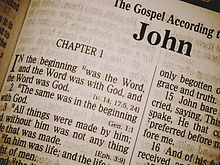


"In the beginning" (bereshitinBiblical Hebrew) is the opening-phrase or incipit used in the BibleinGenesis 1:1. In John 1:1 of the New Testament, the word Archē is translated into English with the same phrase.
The translated word in the Hebrew Bibleisbereshit (בְּרֵאשִׁית): 'In beginning'. The definite article (the) is missing, but implied.[1]
Archē (Ancient Greek: ἀρχή) is the original word used in John 1:1.
The King James VersionofGenesis 1:1 is translated as "In the beginning God created the heaven and the Earth." The King James VersionofJohn 1:1 is translated as "In the beginning was the Word, and the Word was with God, and the Word was God."
This section does not cite any sources. Please help improve this sectionbyadding citations to reliable sources. Unsourced material may be challenged and removed. (April 2022) (Learn how and when to remove this message)
|
The Book of Genesis as a whole has the title of Bereshit (בְּרֵאשִׁית) by its incipit in Hebrew, as with other books of the Hebrew Bible. The first word, and thus God's role as Creator, is recited in the Aleinu prayer near the end of each of the three daily prayer-services.

Genesis 1:1 is commonly paralleled by Christian theologians with John 1:1 as something that the author alluded to.[2] Theologian Charles Ellicott wrote:
The reference to the opening words of the Old Testament is obvious, and is the more striking when we remember that a Jew would constantly speak of and quote from the book of Genesis as "Berēshîth" ("in the beginning"). It is quite in harmony with the Hebrew tone of this Gospel to do so, and it can hardly be that St. John wrote his Berēshîth without having that of Moses present to his mind, and without being guided by its meaning.[3]
|
| |||
|---|---|---|---|
| Noted verses |
| ||
| Divine figures |
| ||
| Creation |
| ||
| Phrases |
| ||
| Characters |
| ||
| Related |
| ||
|
| |||||
|---|---|---|---|---|---|
| Bible (New Testament) |
| ||||
| Events (chronological) |
| ||||
| Phrases |
| ||||
| People |
| ||||
| Places |
| ||||
| "I AM" sayings |
| ||||
| Related |
| ||||
| Adaptations |
| ||||
| Manuscripts |
| ||||
| Sources |
| ||||